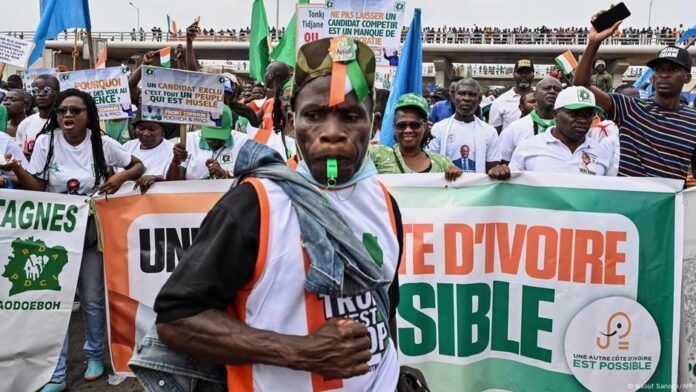The presidential election on October 25 in the West African nation comes after a decade of relative stability following the post-electoral crisis of 2010–2011, which left thousands dead and a nation divided. While Ivory Coast has since enjoyed strong economic growth, deep political fault lines remain.
The vote will follow a two-round system: If no candidate secures more than 50% of the vote, the election will head to a runoff. The elected president will serve a five-year term, which would allow him or her to shape the country’s political direction for the remainder of the decade.
Ouattara makes unprecedented bid for fourth term
President Alassane Ouattara, 83, is seeking a fourth term after constitutional changes in 2016 reset term limits. A former International Monetary Fund economist, Ouattara is expected to win. Under his leadership, Ivory Coast became one of Africa’s fastest-growing economies, buoyed by major infrastructure investments.
According to the World Bank, Ivory Coast “has sustained one of the fastest growth rates in sub-Saharan Africa for more than a decade.” The World Bank adds that “between 2012 and 2019, real GDP expanded at an average of 8.2%,” with growth persisting even through the COVID-19 pandemic.
One beneficiary of government investment and economic growth is the key agricultural region around Daloa. Situated about 140 kilometers (about 85 miles) west of the capital, Yamoussoukro, the area previously lacked industrial zones. But the government’s Infrastructure Renewal and Urban Management Project (PRICI) has invested in roads, water, sanitation and public buildings.
Daloa resident Danielle Zahui told DW: “We came out in numbers to thank the president for what he’s done for Daloa.”
Yet challenges remain. Only 25% of secondary roads are paved, and the 191-kilometer stretch between Daloa, Vavoua, Seguela, and Kani is in poor condition.
“The road is terrible,” said tailor Yaya Sanogo. “Even getting around is a problem.” Ahead of the election, Ouattara has promised a highway linking Daloa to Yamoussoukro.
“We’re entering the 2025–2030 period with energy,” Ouattara told Daloa residents on the campaign trail in early October. “Growth will continue, and we’ll deliver more infrastructure, production and better living conditions.”
Opposition candidates barred from vote
Ouattara’s decision to run again for his party, the Rally of Houphouetists for Democracy and Peace, has reignited a familiar debate about term limits and democratic credibility.
Several prominent opposition figures have been barred from running: former president Laurent Gbagbo, ex-prime minister Guillaume Soro, former prime minister Pascal Affi N’Guessan of the Ivorian Popular Front, former youth leader Charles Ble Goude and former Credit Suisse CEO Tidjane Thiam. Their exclusion has sparked criticism and raised concerns about the fairness of the electoral process.
Thiam, leader of the Democratic Party of Ivory Coast – African Democratic Rally (PDCI-RDA), was seen as Ouattara’s strongest challenger but was disqualified for being a French-Ivorian dual national and then removed from the electoral role for being too late in renouncing his French nationality. He has called the election a “coronation,” and accused the Ouattara government of abandoning democracy.
Female candidates, independent voices step forward
Longtime political figure Simone Ehivet Gbagbo of the Movement of Capable Generations party is running on a platform focused on decentralization, education and social reform.
“We are still fighting for our democracy, and for decentralization of power,” the ex-wife of the former president told DW.
Henriette Lagou Adjoua, former minister for women’s affairs, is also running. She has pledged stronger legal protections and full implementation of the 30% quota law, which seeks to boost female participation in politics and policy decision-making.
“Women are being marginalized,” she said. “If I win, gender equality will prevail.”
Jean-Louis Billon, a businessman and former minister, told DW he’s running because he wants to make Ivory Coast an economically strong nation and help grow the private sector. For him, economic modernization, combating unemployment, reducing inflation and private sector growth are key.
“Ivorians want change,” he told DW. “We can achieve change through the election. Let’s dare to change. Let’s go vote. All of us.”
With more than 60% of Ivorians aged under 25 according to the United Nations Population Fund, job creation remains one of the most urgent concerns.
Ahoua Don Mello, vice-president of the African People’s Party-Cote d’Ivoire, is running as a “precautionary candidate” for banned ex-President Gbagbo, the party leader. His priorities include democratic reform, economic sovereignty and Pan-African integration.
“We need an amnesty law, to release political prisoners and restore excluded candidates’ rights,” he told DW.
Though not barred from the vote, these lesser-known candidates are not seen as a threat by the Ouattara government and are not expected to win.
Government targets security, disinformation ahead of vote
Regional instability — especially in neighboring Burkina Faso, Mali and Guinea— has made security a major issue for the country. In a bid to secure the electoral process the government has launched Operation Hope, deploying 44,000 security personnel and banning protests. While the state has said this aimed to prevent unrest and maintain order throughout the vote, critics have said the move restricts opposition mobilization and public debate.
Amnesty International has criticized the blanket ban on peaceful demonstrations, calling it a violation of civil liberties and democratic norms. Meanwhile, disinformation campaigns from Sahel countries have prompted a government response, including billboards warning “Fake news divides, truth unites.”
The National Agency for Information Systems Security, Ivory Coast’s cybersecurity agency, in August accused social media accounts with tens of thousands of followers from Sahel countries of trying to “incite disorder” after the exclusion of Thiam and other politicians from the polls.
The Economic Community of West African States, ECOWAS, has deployed long-term observers to monitor the process and help prevent conflict. As the West Africa region grapples with coups and disputed elections, this election is seen as more than a contest for power — it is a test of Ivory Coast’s democratic resilience.
Julien Adayé contributed to this article.
Edited by: Cai Nebe
Source link






